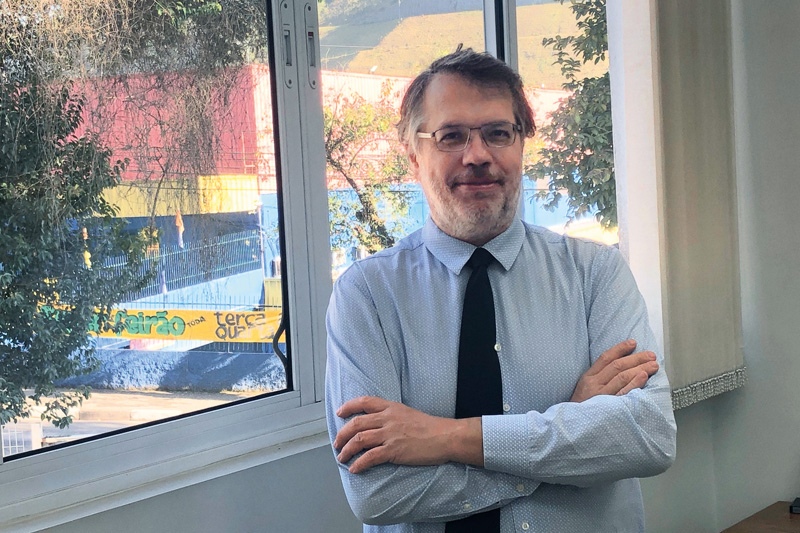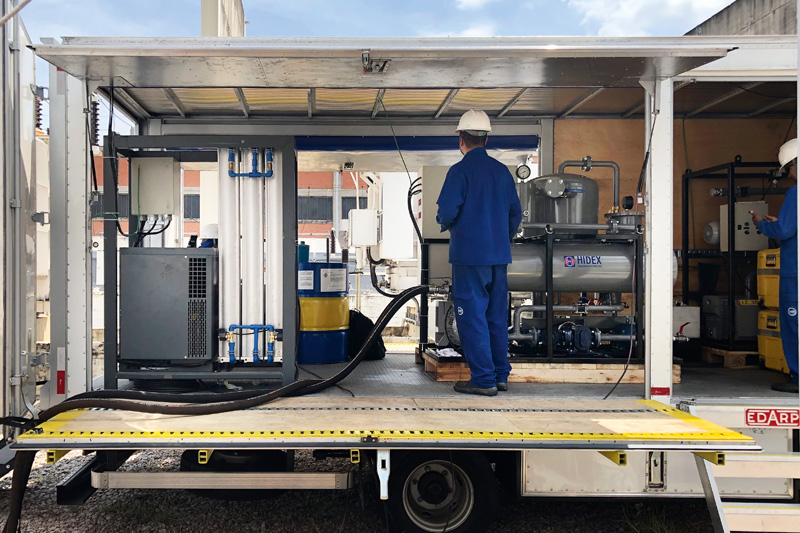For 40 years, MR has served the South American market from its subsidiary in the metropolis of São Paulo in Brazil. Now, the subsidiary is taking its first steps into the transformer service business. The aim is to provide an all-inclusive package for customers in the energy sector.
Brazil, beginning of 1976. A young Marcelo da Costa is playing in his parents’ living room in São Paulo when his eyes fall on one of the magazines that his father always brings home from work. It is an MR magazine. “I’m going to work there when I grow up, dad!” shouts the little boy. His father smiles to himself. Fast-forward to the present day, and it turns out that Marcelo was right—he is now General Manager at MR Brazil, where he heads a team of 75 employees.

The MR subsidiary in Brazil is situated around 20 kilometers from the metropolis of São Paulo, a city with 12 million inhabitants. In 1980, MR acquired its premises on the outskirts of the city and opened its first subsidiary outside Germany. “Our primary focus is on the Brazilian market, although we also serve a number of key customers across South and Latin America,” explains da Costa. The site’s proximity to São Paulo, Brazil’s financial center, is ideal thanks to nearby airports and excellent access to the freeway. The subsidiary also benefits from a good supply of skilled workers and applicants who are trained by MR in its in-house training center.
75 employees
work at the subsidiary in São Paulo
Joining the premium segment
MR Brazil is now facing its biggest challenge yet: gaining a foothold in the transformer service business. By deploying what the subsidiary calls oil rigs—trucks that have been specially equipped instead of kitted out for transformer oil treatment—da Costa is aiming to offer his customers an all-inclusive package for maintenance and servicing.
“Brazil is a location where service is an emerging market, so we are working to expand the services we offer for tap changers and transformers.”Marcelo da Costa, General Manager
The trucks enable MR to cover cities and less developed areas alike. Brazil is a location where service is an emerging market, but with just four trucks, MR Brazil is still in the early stages of its development in this sector. “We have gained a great deal of experience in transformer maintenance over the past five years, but we still have a lot to learn,” says da Costa. “Our focus is on industrial customers in the premium segment—there isn’t so much competition here as you need certificates, something that smaller firms can’t afford,” he explains.
28 Service Technicians
take care of on-load tap-changer and transformer maintenance
Looking to the future
MR Brazil reached a real milestone in 2019 when it obtained two of these vital certificates: one for its environmental efforts and one for employee health. To boost its visibility in the transformer service premium segment, MR also relies on cooperation with major players in the service industry. “It’s a win-win situation,” states da Costa. “We obtain in-depth insights into the transformer service business and our partners benefit from our expertise in tap changers.”
With tap changers representing its core business, this is certainly an area where MR Brazil has plenty to offer. The importance of this sector has become particularly clear over the past five years. “An economic crisis started here in 2012,” explains da Costa. “However, it hasn’t really affected us very much.
In fact, we have been able to increase our export figures for tap changers by a good 50 percent during this time. Our export business from Brazil has certainly helped us through the crisis.” This puts MR Brazil in a strong position when it comes to tap changers—and da Costa’s outlook about transformer services is very positive too: “We are absolutely confident that we’ll succeed,” he states.
 528 TWh
528 TWh
of electricity is consumed by Brazil’s inhabitants each year. Consumption has increased by around 140 percent since 1990.
 141.388 Kilometers
141.388 Kilometers
of power cables cross through the country.
This is set to increase to 185,484 kilometers by 2023.
 80 Percent
80 Percent
of the electricity produced in Brazil comes from hydropower. That’s 417 TWh in total. This makes the South American country the second-largest producer of hydropower after China.
YOUR CONTACT
 If you would like to know more about the work of MR’s Brazilian subsidiary, please contact
If you would like to know more about the work of MR’s Brazilian subsidiary, please contact
General Manager Marcelo da Costa:
M.Costa@br.reinhausen.com


